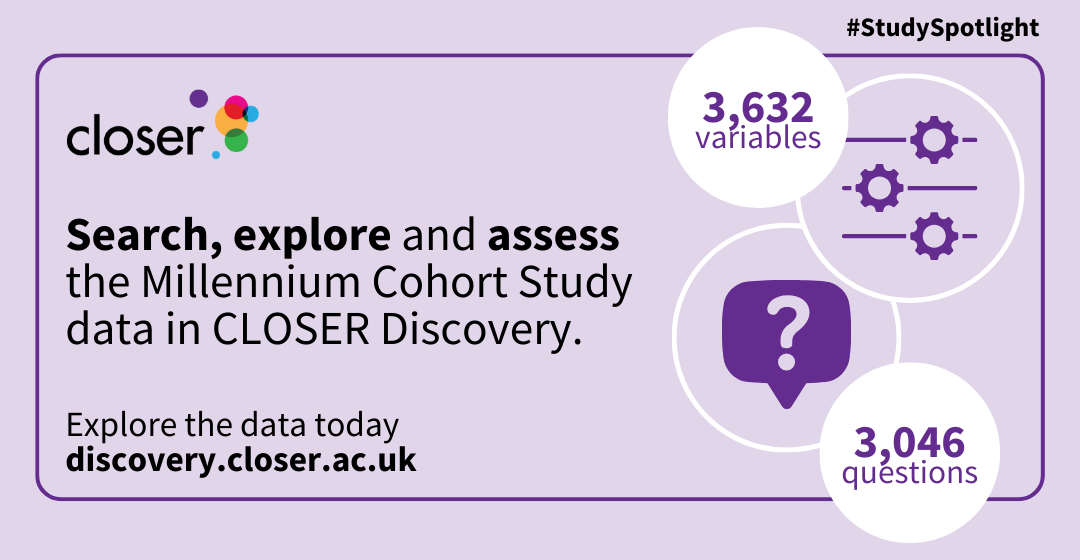 In our final Study Spotlight, we’re shining a light on the Wirral Child Health and Development Study (WCHADS) which follows families in the Wirral area of north-west England.
In our final Study Spotlight, we’re shining a light on the Wirral Child Health and Development Study (WCHADS) which follows families in the Wirral area of north-west England.
About the study
Established in 2007, WCHADS aims to investigate the reasons why some children develop emotional and behavioural difficulties at an early age, as well as the factors that cause these problems to continue throughout childhood and adolescence. The study was originally designed to study the origins of conduct problems but has expanded to assess all mental health difficulties.
Between March 2007 and December 2008, the study recruited 1,233 first time mothers during their 20-week pregnancy scan. There have been 13 waves of data collection to date, from pregnancy up to age 13 years, with the study currently carrying out a round of follow-up surveys at age 15 years. Across these data collections, the questionnaires have been completed by the children’s mothers, fathers and teachers; since the age of 11 years, the children have completed these themselves.
Across these data collections, assessments have included exposure to stress during pregnancy or in early life, aspects of the parent-child relationship, genetic make-up, family and peer relationships, cognitive and language development, physiological development, and poverty and social circumstances. As the children have entered adolescence, the study has also asked about social media use, friendships, bullying and isolation, physical activity levels and physical development, risky behaviours, and physical and psychological changes associated with puberty.
Over the years, WCHADS has offered valuable insights into children’s development and mental health. Recent research has investigated the hypotheses that being securely attached to a caregiver who may be a source of threat would create vulnerability for later mental health problems.
Also, in a series of publications, WCHADS has provided evidence that mental health outcomes in girls are better when prenatal and postnatal depression/anxiety are matched rather than different:
- Predictions of children’s emotionality from evolutionary and epigenetic hypotheses;
- Mismatched Prenatal and Postnatal Maternal Depressive Symptoms and Child Behaviours: A Sex-Dependent Role for NR3C1 DNA Methylation;
- Prenatal anxiety, maternal stroking in infancy, and symptoms of emotional and behavioral disorders at 3.5 years
Discover the data
 In 2022, WCHADS metadata was added to our bespoke research tool that enables researchers to search, explore and assess data from multiple UK longitudinal population studies in an unprecedented level of detail.
In 2022, WCHADS metadata was added to our bespoke research tool that enables researchers to search, explore and assess data from multiple UK longitudinal population studies in an unprecedented level of detail.
A filtered search of WCHADS in CLOSER Discovery currently pulls up 3,632 variables, 3,046 questions and 10 datasets ready and waiting to be explored. This metadata covers a range of research topics including mental and physical health, family and social networks, child development, life events, employment and income, health behaviours and more!
Response to the COVID-19 pandemic
WCHADS was part way through the planned age 11-12 years questionnaire wave when the COVID-19 pandemic hit the UK in March 2020, placing the study in a unique position of collecting data immediately pre-pandemic on a sub-set of the sample. The team paused fieldwork and launched a COVID-19 survey to the whole sample in June 2020, which included a repeat survey to those who provided pre-pandemic data.
The survey included the study’s mental health questionnaires and a range of bespoke questions on how the pandemic impacted family life (e.g. schooling, work, income/financial difficulties, COVID-19 infection). The age 13 questionnaire wave in 2021 provided a mental health outcome one year on from the pandemic.
Recent research using the study’s COVID-19 data has examined whether the apparent effect of the pandemic on adolescent mental health may have been “masked” or explained by the normal change in symptoms with age over adolescence. Using the repeated data WCHADS collected around the time of the pandemic, the team were able to separate out the effects of the pandemic from the effects of development. They showed that the apparent pandemic-related increase in girls’ depression was actually explained by the sharp rise of depression symptoms experienced by girls in early adolescence, whereas for boys, the typical pattern of decrease in depression symptoms masked a pandemic effect on depression. This indicates that existing work has likely underestimated the pandemic effect on boys’ mental health.
Scratching the surface
Of course, this Study Spotlight is just a whistle-stop tour of WCHADS and insight into the data it has collected over the years. If you would like to access the data or have any questions about the study, please get in touch with the study team.
You can keep up to date with all the latest developments on WCHADS and the longitudinal research community, sent direct to your inbox, via our monthly newsletter, Longitudinal News.
Further information
This blog is part of our ‘Study Spotlight’ series. This series showcases the CLOSER partner studies, demonstrating how to make the most of these valuable assets through CLOSER’s research resources. Every month, we turn the spotlight on a new theme, producing a series of blogs that delve into the backgrounds of studies that share similar characteristics, such as their study sample, design, or topics of research interest.
‘Study Spotlight’ helps you gain a deeper understanding of the studies in our partnership and how you can better utilise these on your research journey.
Previous Study Spotlight blogs:
- ALSPAC and the millennial generation (April 2023)
- Next Steps and the millennial generation (April 2023)
- ELSA and the ageing population (May 2023)
- Hertfordshire Cohort Study and the ageing population (May 2023)
- MRC NSHD and the ageing population (May 2023)
- MCS and the British birth cohorts (June 2023)
- BCS70 and the British birth cohorts (June 2023)
- NCDS and the British birth cohorts (June 2023)
- Understanding Society: The UK Household Longitudinal Study (July 2023)
- ONS Longitudinal Study (July 2023)
- Back at school with Growing Up in Scotland (September 2023)
- Generation Scotland (October 2023)
- Northern Ireland Cohort for the Longitudinal Study of Ageing (January 2024)
- Born in Bradford – can a research project change a city? (February 2024)
- Longitudinal Study of Young People in England: Cohort 2 (March 2024)
- Southampton Women’s Survey (June 2024)
- Whitehall II Study (July 2024)
- Health and Employment After Fifty Study (July 2024)
Related links
